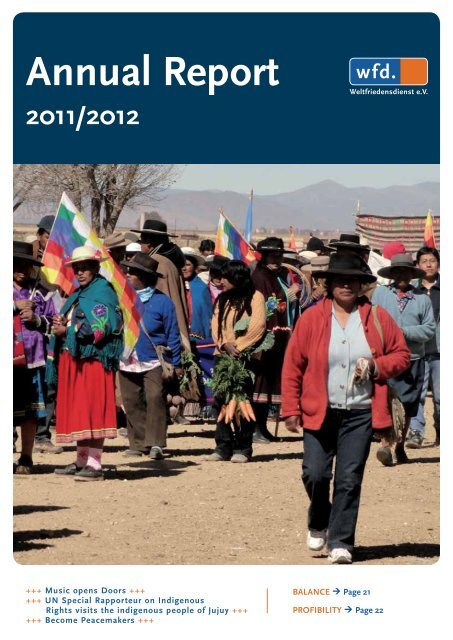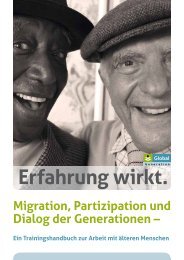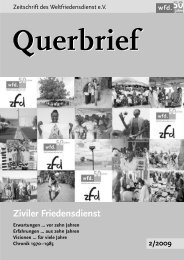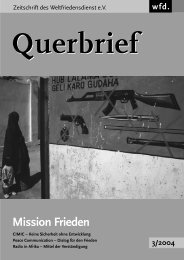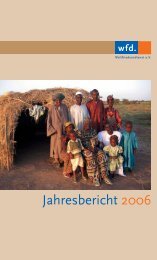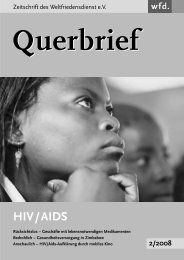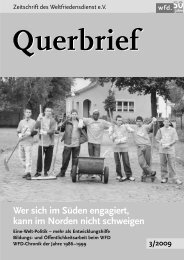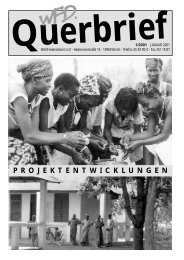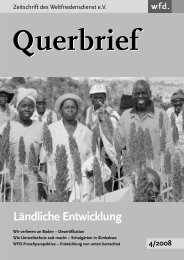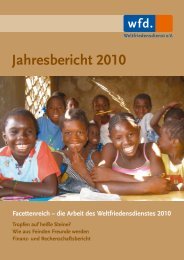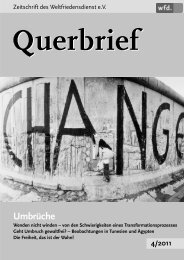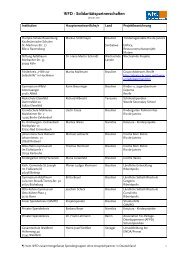annual report - Weltfriedensdienst e.V.
annual report - Weltfriedensdienst e.V.
annual report - Weltfriedensdienst e.V.
You also want an ePaper? Increase the reach of your titles
YUMPU automatically turns print PDFs into web optimized ePapers that Google loves.
<strong>annual</strong> <strong>report</strong><br />
2011/2012<br />
+++ Music opens Doors +++<br />
+++ Un Special rapporteur on indigenous<br />
rights visits the indigenous people of Jujuy +++<br />
+++ Become Peacemakers +++<br />
Balance Page 21<br />
ProfiBility Page 22
inDeX<br />
eDitorial<br />
page 3<br />
HUMan riGHtS<br />
page 4<br />
Great Joy - Deep concern<br />
civil Peace Service<br />
page 6<br />
Music opens Doors<br />
Music therapy in Palestine<br />
PartnerSHiPS<br />
page 8<br />
a year of teaching for 400 euros<br />
page 9<br />
Peace and Development network<br />
WfD - ProJectS 2011<br />
page 10<br />
2 Annual Report<br />
cooPerantS<br />
page 12<br />
Partners 2011<br />
interns 2011<br />
eDUcational WorK<br />
in GerMany<br />
page 13<br />
education projects on your own front<br />
door – Global Generation and<br />
work4peace<br />
fUnDraiSinG<br />
page 14<br />
your trust is precious<br />
PUBlic relationS<br />
page 16<br />
Public relations for Peace,<br />
Development and Human rights<br />
yoU May orDer tHeSe MaterialS<br />
for yoUr Peace WorK:<br />
"friedensförderung" tool Box<br />
Swab ear cleaning,water level or<br />
magnifying glasses: every day objects<br />
convey conflict resolution essentials<br />
DonationS<br />
page 17<br />
WfD - foundations and Board<br />
of trustees<br />
page 18<br />
10 years working together for peace<br />
and development:<br />
page 19<br />
in memory of erich Grunwaldt<br />
aSSociation<br />
page 20<br />
the Weltfriedensdient e. v.<br />
BUDGet<br />
page 21<br />
Balance Sheet and income<br />
Statement 2011<br />
effectS<br />
page 24<br />
one of our greatest successes of 2011<br />
"Gewaltfrei für den frieden" Book Paroles de Paix/friedensbotschaften<br />
(rap-cD)<br />
25,- € 10,- € 10,- €<br />
We have interesting films from our projects, as well as several exhibitions.<br />
you may request an overview here: zint@wfd.de
Dear reaDer,<br />
A typical Tuesday morning at<br />
10 am in the WFD office:<br />
People run frantically down the<br />
hall, coffee cup in hand, offer others<br />
a rushed greeting and disappear<br />
into their offices. In the international<br />
section a small group<br />
of shortlisted candidates for a<br />
position in Palestine has formed,<br />
the sign on the door reads ‘Do<br />
not disturb!’, the next hopeful<br />
has already gone upstairs. In<br />
the next room a staff member<br />
prepares her application for a<br />
women’s project in Zimbabwe.<br />
The postman pushes a large trolley<br />
along the floor; that will most<br />
certainly be the freshly printed<br />
display for schools that the work-<br />
4peace team have been eagerly<br />
awaiting. Someone curses loudly<br />
because their Skype connection<br />
to West Africa keeps breaking<br />
up. From the offices comes the<br />
clatter of keyboards, eyes fixed<br />
on their screens. The ladies in<br />
the Finance Department are in<br />
need of a strong coffee after staying<br />
up late last night to conquer<br />
the mountain of documents that<br />
needed checking from a project<br />
in Argentina. The Fundraising<br />
Team welcome good friends from<br />
the Bergneustadt community,<br />
where dedicated individuals have<br />
been supporting various WFD<br />
projects for over 10 years; what<br />
new ideas are there for joint fundraising<br />
adverts this year? Even<br />
when the daily demands are high,<br />
the successes, which we have<br />
achieved together with our partners<br />
in the South, keep us going:<br />
▪ In Palestinian Ramallah the<br />
Centre for society-oriented music<br />
therapy, Al Mada, prepares<br />
the way for a peaceful future<br />
in the Middle East. Music and<br />
art therapy for children and<br />
young people in four refugee<br />
camps across the West Bank<br />
help them to process and deal<br />
with the trauma they have experienced;<br />
something that is particularly<br />
widespread among this<br />
target group. Read our related<br />
<strong>report</strong> on page 6.<br />
▪ In Guinea-Bissau, together<br />
with our partner, DJINOPI (in<br />
English: forward, people!), we<br />
have been working to end the<br />
ritual circumcision of girls.<br />
In June 2011 the Parliament<br />
passed a law criminalising genital<br />
mutilation. DJINOPI was<br />
instrumental in securing this<br />
success, through its broad and<br />
persistent mobilisation. Since<br />
that time the first conviction of<br />
circumcisers has already taken<br />
place.<br />
▪ In South Africa, we support<br />
the fight against the epidemic<br />
spread of HIV/AIDS: Our South<br />
African partner, STEPS for the<br />
Future, has put together the<br />
only civil society organisation<br />
film on HIV/AIDS education<br />
and awareness for prisoners.<br />
Prisoners are trained to become<br />
multipliers in workshops<br />
on the issue and organise film<br />
screenings with accompanying<br />
discussion sessions in their respective<br />
prisons.<br />
editorial<br />
i would like to thank you from the<br />
bottom of my heart, at this point<br />
especially, all our friends and donors,<br />
for your generous support<br />
of our work for peace, development<br />
and human rights. a big<br />
thank you also goes to our members,<br />
the tireless executive Board<br />
and many other volunteers, as<br />
well as our colleagues in the office<br />
and in the projects, for a year<br />
of good and fruitful cooperation.<br />
accompany the WfD and its<br />
partners in the South further with<br />
solidarity at this critical time!<br />
Warm wishes from<br />
Hedemannstraße,<br />
Georg Rohde,<br />
Director<br />
Annual Report<br />
3
Human rights<br />
Great Joy – DeeP concern<br />
UN Special Rapporteur on Indigenous Rights visits the indigenous people of Jujuy<br />
the idyll is deceptive--life in the<br />
Highlands of argentina is arduous<br />
and threatened from different<br />
directions.<br />
t is the sixth December, 2011; on the<br />
I plateau at Ojo de Huancar between the<br />
Argentine provinces of Jujuy and Salta,<br />
around 500 people from 33 indigenous<br />
communities have gathered together.<br />
They have taken the long journey across<br />
the remote Andean steppe in excited anticipation<br />
of an important visitor. James<br />
Anaya, the independent UN Special Rapporteur<br />
for Indigenous Rights, has announced<br />
he will be visiting and the high<br />
hopes of those gathered rest upon him.<br />
During his visit he will gather information<br />
regarding the situation of the indigenous<br />
peoples and <strong>report</strong> back to the United<br />
Nations. After hours of waiting a helicopter<br />
finally appears on the horizon. Amid<br />
the deafening noise it comes closer and<br />
the colourful flags are swept to and fro<br />
in the powerful winds. As the sound of<br />
the engine slowly dies away, the vibrant<br />
music, welcoming James Anaya to the<br />
region, can finally be heard. Despite the<br />
joyous welcome, the visit is viewed with<br />
great seriousness; Anaya was invited in<br />
order to inform him about the worrying<br />
human rights situation on the ground.<br />
4 Annual Report<br />
The indigenous population is afflicted<br />
in a number of very specific ways. The<br />
problems they face range from eviction<br />
to the destruction of their economic and<br />
cultural livelihoods to ethnic discrimination.<br />
Indigenous women particularly<br />
suffer; Anaya was introduced to the<br />
complex set of problems in a meeting<br />
between himself, the Head of the Council<br />
of Indigenous Organizations of Jujuy<br />
(COAJ), Natalia Sarapura, and some<br />
employees of the project “Jurisprudence<br />
Indigenous Woman” (Jurisprudencia<br />
Mujer Indígena).<br />
tHe riGHtS of WoMen in<br />
ParticUlar are DiSreGarDeD<br />
Many indigenous women suffer from<br />
systematic violations of their rights.<br />
Even in education, which should be<br />
helping to pave the way to self-determination<br />
and improved living conditions,<br />
they encounter almost insurmountable<br />
obstacles. The excessively high rate of<br />
illiteracy among indigenous women<br />
speaks for itself. In many indigenous<br />
communities there is, at best, only one<br />
poorly-equipped primary school.To<br />
attend secondary school, pupils must<br />
either travel great distances or relocate.<br />
For an indigenous woman these options<br />
pose great difficulties. The roads are<br />
often dangerous and cumbersome,<br />
especially when walking with children.<br />
Funding for transportation or even<br />
a home in another city is as good as<br />
non-existent. What's more, the curricula<br />
of Argentine schools do not take into account<br />
the diversity of the ethnic groups<br />
in the country. Even the cities in which<br />
higher education is offered do not allow<br />
the indigenous people to maintain their<br />
traditional way of life. Often they cannot<br />
even keep their own language. This<br />
public education structure has profound<br />
impacts on the lives of indigenous people.<br />
Their identity and the social integrity<br />
of the communities are at stake; the<br />
women, many among them mothers,<br />
feel responsible for passing their culture<br />
down to their children.<br />
GettinG JUStice<br />
The participants of the project, "Jurisprudence<br />
Indigenous Woman", under the<br />
leadership of COAJ President, Natalia<br />
Sarapura, and supported by the <strong>Weltfriedensdienst</strong>,<br />
stand up against this<br />
fundamental injustice. They distribute<br />
information on the situation and encourage<br />
women to integrate into non-state<br />
educational institutions. COAJ itself has<br />
taken an important step in creating a<br />
degree programme entitled "Indigenous<br />
Development". Above all, the project<br />
helps the women to stand up for their<br />
rights in court, when they are violated.<br />
The visit of James Anaya is very important<br />
to the success of their work. Anaya<br />
has the means to bring the difficult situa-
tion faced by indigenous women into the<br />
Argentine and international public domains.<br />
The project hopes that through<br />
his recommendations to the Argentine<br />
government the regional jurisprudence<br />
will finally comply with national laws and<br />
international agreements. This is also<br />
the expectation held by those assembled<br />
to welcome Anaya on the plateau at Ojo<br />
de Huancar. Standing before the Salinas<br />
Grandes salt sites they want to portray<br />
to Anaya the human rights violations<br />
taking place there. A mining company<br />
is extracting the coveted commodity,<br />
lithium, from the salt sites in apparent<br />
agreement with the Argentine government.<br />
Lithium is at a premium because<br />
it is needed for products such as mobile<br />
phones.<br />
The lithium producers prohibit access<br />
for the indigenous people to the salt<br />
deposits. The extraction also threatens<br />
to oversalt the groundwater thus deeming<br />
it unusable for irrigation of the arid<br />
landscape. The local indigenous people<br />
who have collectively mined the salt and<br />
farmed the land sustainably for generations,<br />
have taken the matter to court.<br />
Their right to information and participa-<br />
tion has been massively violated; now<br />
they face a threat to their livelihoods.<br />
Since elsewhere civil resistance, such<br />
as street occupations, has been stifled<br />
by military operations, the only way out<br />
of the conflict seems to be through the<br />
courts. The indigenous people of Salinas<br />
Grandes are forced to wait for justice to<br />
award them the land titles for the salt<br />
sites and surrounding land, before it is<br />
too late.<br />
StoreS WitH HiGH HoPeS<br />
By the end of his visit, James Anaya<br />
appears to have been greatly influenced<br />
by his time there; it is clear he has taken<br />
the concerns of the indigenous people<br />
of Jujuy to heart. His first summary<br />
gives hope: It seems he has understood<br />
the concerns of the people. Anaya<br />
climbs back into the helicopter, laden<br />
with the high hopes of many people. His<br />
recommendations should capture the<br />
experiences of the indigenous people of<br />
Jujuy and Salta and move the Argentine<br />
government to take action. Meanwhile,<br />
the indigenous people return to their<br />
communities and continue the fight for<br />
their rights. ▪<br />
especially children and women hope for<br />
support from the international community<br />
Human rights<br />
The UN Special Rapporteur for Human<br />
Rights, James Anaya, visited the<br />
WFD project in Jujuy, Argentina from<br />
27th November to 7th December, 2011.<br />
His <strong>report</strong> provides both an assessment<br />
of the situation of indigenous<br />
people and recommendations to the<br />
government.<br />
He recognizes advances in the field of<br />
indigenous rights but nevertheless notes<br />
a gap between the normative framework<br />
and its implementation in reality.<br />
The <strong>report</strong> particularly focuses on the<br />
need to protect the land rights of the<br />
indigenous communities and the natural<br />
resources in their territories. There<br />
are conflicts relating to the extraction of<br />
raw materials through mining and the<br />
agro-industry as well as forced resettlement.<br />
Further addressed in the <strong>report</strong><br />
was the social and economic situation<br />
facing indigenous people in Argentina,<br />
particularly concerning their access to<br />
education, health and justice. He also<br />
commented critically on the criminalization<br />
of social protests relating to the<br />
conflicts surrounding indigenous territories.<br />
The <strong>report</strong> will be presented to both<br />
the UN Human Rights Council and the<br />
UN General Assembly.<br />
coaJ ProJect<br />
type of Project: Strengthening indig-<br />
enous communities from Jujuy to as-<br />
sert their human rights<br />
-Indigenous participation in the rural<br />
development of Jujuy, human rights<br />
work.<br />
local partner: COAJ; Consejo de Organizaciones<br />
Aborigenes de Jujuy,<br />
(Council of Indigenous Organizations<br />
of Jujuy)<br />
Period: 2009 – 2013<br />
facilitator: Alejandra Castro de Klede<br />
(Geographer)<br />
funding: German Federal Ministry for<br />
Economic Cooperation and Development<br />
(BMZ) + Donations<br />
+Contribution from COAJ<br />
Annual Report<br />
5
civil Peace Service<br />
MUSic oPenS DoorS - MUSic tHeraPy in<br />
PaleStine<br />
children handle situations much<br />
better when they have play time<br />
- al Mada offers them the<br />
opportunity to do so.<br />
The Centre for Society-Oriented<br />
Music Therapy, Al Mada, operates<br />
in Ramallah in Palestine’s only music<br />
therapy centre. A recording studio for<br />
local musicians is also attached. Art fosters<br />
community, which is what makes Al<br />
Mada so special in this violence-oriented<br />
environment.<br />
The collaboration between Al Mada<br />
and WFD started in 2009. The result<br />
was a child with two very different<br />
parents. One is an expert in development<br />
cooperation and the enforcement<br />
of human rights who has got together<br />
with a popular Palestinian musician<br />
and composer. Both are of the opinion<br />
that music and performing arts open<br />
the door to self-fulfilment, health and<br />
social justice. The development of<br />
a country cannot only be measured<br />
by the size of its GDP, quality of life<br />
must also be taken into account.<br />
All programs run by Al Mada are aimed<br />
at development, but they always also<br />
have a therapeutic objective. Music<br />
6 Annual Report<br />
therapy is already well established in the<br />
health care systems of many countries.<br />
The Palestinian experience is so unique<br />
that music therapy there requires a<br />
special approach. Over the last three<br />
years Al Mada’s music therapists have<br />
developed a system adapted to such<br />
a situation. They offer approaches<br />
suitable for both individual and group<br />
therapy. Teachers, counsellors, social<br />
workers and health care workers are<br />
trained in these therapeutic techniques,<br />
thereby expanding the capacity for<br />
psychological counselling to the most<br />
vulnerable members of the community.<br />
tHe al MaDa ProJect<br />
Project type: Music therapy with Al Mada / Civil Peace Service<br />
Al Mada also incorporates programs<br />
with a similar focus into its activities:<br />
There are courses on “The Art of<br />
Living", "Art for Children", "The Art of<br />
Education", "The Art of Gender", "The<br />
Art of Lobbying" and "Art for Health".<br />
These are all key issues which Al Mada<br />
works on alongside experts such as<br />
the Palestinian Ministry of Health,<br />
Education and Higher Education, UN<br />
agencies (UNRWA, UNICEF) and many<br />
local organizations. These programs do<br />
not only take place the Al Mada centre<br />
itself, but also in the refugee camps.<br />
Within the framework of the programs,<br />
"Art for Children" and "The Art of<br />
Education", Al Mada has developed<br />
its own methods for child development,<br />
through which they have made<br />
a significant contribution towards<br />
the improvement of educational opportunities<br />
for children of all ages in<br />
Palestine. One particularly noteworthy<br />
feature of the method is the inclusion<br />
of parents, children and teachers in<br />
the learning processes, thus improving<br />
mutual understanding. Furthermore<br />
improvements are perceived as a shared<br />
success between these three parties.<br />
This approach has already proved effective<br />
in kindergartens and schools<br />
in the West Bank and Jerusalem.<br />
local Partner: Al Mada Association for Art based Community Development<br />
Location: Ramallah, Palestine<br />
Period: 2009 - 2013<br />
facilitator: Mallory de Blois, Communications Scientist (7/2010 - 7/2011); Uli<br />
Schießl, Social Worker (until 07/2012); Jenny Boylan, Lawyer / Human Rights<br />
Activist (08/2011 - 07/2013);<br />
funding: Federal Ministry for Economic Cooperation and Development (BMZ)<br />
+ donations
"The Art of Living" and "The Art of Gender"<br />
are versatile programs. With the<br />
help of creative techniques, individuals<br />
of all ages learn to process their experiences<br />
in constructive ways. At the end<br />
of each unit there is a production, such<br />
as an exhibition or theatre performance.<br />
These programs are also used, for<br />
example, to support people with dis-<br />
abilities in the fight for their rights. The<br />
program, "Art for Health", was developed<br />
together with Al Mada’s long-time<br />
partner, UNRWA (the UN agency dedicated<br />
to Palestinian refugees). It was so<br />
successful that it has been incorporated<br />
into many UNRWA programs, such as<br />
psychiatric care and child protection. ▪<br />
civil Peace Service<br />
Beginning of 2011 musician John Mclaughlin with € 15,000 prize money had worldclass<br />
jazzahead!-Skoda award. Because of the suggestions form teh WfD, he donated<br />
$ 10,000 of the prize money to al Mada. in addition, he was part of the benefit concert<br />
for al Mada, it took place on february 14, 2012 in ramallah. (© ridvan yumlu)<br />
iMPreSSionS of al MaDa<br />
"On Fridays the doors are opened and<br />
anyone who wants can take part in a<br />
free music therapy session. All of a<br />
sudden Al Mada is bursting with life.<br />
Excited young children romp around<br />
and play with craft materials or paint.<br />
Meanwhile their parents speak with<br />
the therapists. It is not surprising that<br />
everyone feels so comfortable at Al<br />
Mada; the building is painted in bright<br />
colours and there is a cosy kitchen<br />
and a garden”<br />
“It is always interesting to observe the<br />
way visitors behave before, during and<br />
after their visit to Al Mada. On arrival,<br />
the new ones are still nervous, a bit<br />
curious and often quite uneasy. But<br />
even before the first coffee break in<br />
the office, there is already clapping,<br />
singing and drumming streaming out<br />
from the therapy rooms. It's amazing<br />
how much someone’s behaviour<br />
can change in just a few hours. Selfconscious<br />
restraint turns into highspirited<br />
relaxation. This gives us hope<br />
for lasting change. Al Mada leaves a<br />
mark. "<br />
Annual Report<br />
7
Partnership<br />
a year of teacHinG for 400 eUroS<br />
Elsenfeld School supports Wende Secondary School in Tanzania<br />
teacher Somon Mabena (right)<br />
ralks to students about his country,<br />
tanzania.<br />
When Simon Mabena walks into<br />
the classroom of 9C at Elsenfeld<br />
School his eyes light up and he feels like<br />
he’s entered another world. "I feel very<br />
fortunate that I can be here and have<br />
the opportunity to answer questions<br />
from students about my homeland,<br />
Tanzania". Simon Mabena (33) is a<br />
Sport, History and English teacher at<br />
Wende Secondary School, a school on<br />
the outskirts of Njombe in the South<br />
West highlands of Tanzania. As well as<br />
visiting the state secondary school, a<br />
visit it also planned to the town hall.<br />
Mabena recounted stories of the problems<br />
in his homeland: It costs 59,607<br />
Tanzanian shillings, which works out<br />
at around €400, per student, to cover<br />
teacher salaries, teaching materials,<br />
accommodation and meals of maize<br />
porridge and beans, each year. Mabena<br />
explains, "That’s a lot for most students<br />
8 Annual Report<br />
who live in poor conditions". Many of<br />
the students come from poor families<br />
and some are orphans or half-orphans.<br />
They do have one thing in common<br />
though: "They are very disciplined and<br />
eager to learn", Mabena adds optimistically.<br />
Scholarships enable students to<br />
attend secondary school. Some parents<br />
are of the opinion that it is not worthwhile<br />
to send their children to school<br />
because the children are of better<br />
use helping in the fields and have to<br />
guard the goats and cows. Particularly<br />
during harvest time they are taken out<br />
of school to help work in the fields.<br />
In addition, heavy rains which cause<br />
flooding, epidemics and famines also<br />
sometimes hinder school attendance.<br />
In addition, Muslim boys who are<br />
circumcised during the school calen-<br />
dar stay at home for 30 to 40 days and<br />
pregnant girls are completely excluded.<br />
On 1st January 2007, Elsenfeld School<br />
(near Aschaffenburg) set up a fund to<br />
provide scholarships at Wende Secondary<br />
School. "We get money for talented<br />
but impoverished students and orphans<br />
in the most AIDS-affected regions,"<br />
said Richard Albrecht, the teacher<br />
responsible for the project at the<br />
school. "Together with the principal of<br />
Wende Secondary School, Enhard John<br />
Mlelwa, we agree on the exact criteria<br />
students must meet to be included in<br />
the support program," adds Susanne<br />
Fuchs, who supervises the project.<br />
Since they began, the school has<br />
already been able to support seven<br />
children; the youngest of which is ten<br />
and the eldest, twenty-one. As well as<br />
Elsenfeld School, the Hildegard von<br />
Bingen Gymnasium in Brühl is also<br />
involved with the local One-World<br />
shop in the town, working towards the<br />
development and modernization of<br />
Wende Secondary School. The money<br />
raised will be invested in electricity, new<br />
water pumps and new classrooms. The<br />
partnership project is one of about 60<br />
nationwide, which are supervised by the<br />
WFD in Berlin. "The WFD know where<br />
the need is particularly great and can<br />
negotiate locally with the African project<br />
leaders," said Richard Albrecht, who<br />
is confident that "the WFD will ensure<br />
that our donations are put to good use".<br />
Albrecht has been connected with the<br />
WFD since he took part in a study tour<br />
of Brazil 20 years ago. Since then, he<br />
has never let go of the organization.<br />
Martin Roos<br />
Main-Echo, reprinted with courtesy
Peace anD DeveloPMent netWorK<br />
Guatemala<br />
Nicaragua<br />
Equador<br />
Peru<br />
LATEINAMERIKA AFRIKA<br />
Brasilien<br />
Königswinter<br />
Velen<br />
Bottrop<br />
Bad Neuenahr<br />
Unna<br />
Mönchengladbach<br />
Köln<br />
Dörth<br />
Varel<br />
Wiefelstede<br />
Bückeburg<br />
Delmenhorst<br />
Waldbröl<br />
Erpel<br />
Bonn<br />
Bergneustadt<br />
Senegal<br />
Hochheim Elsenfeld<br />
Darmstadt<br />
Karlsruhe<br />
Mühlacker<br />
Herrenberg<br />
Rottweil<br />
Halstenbek<br />
Hamburg<br />
Burgwedel<br />
Guinea<br />
Alfeld<br />
Bad Gandersheim<br />
Paderborn<br />
Friedberg<br />
Bad Mergentheim<br />
Eisenberg<br />
Bad Grönenbach<br />
Überlingen Ravensburg<br />
Ghana<br />
Benin<br />
Berlin<br />
Namibia<br />
Sambia<br />
Südafrika<br />
Partnership<br />
WorlDWiDe netWorK for Peace<br />
Personal contacts and the common desire for change unite 49 groups in Germany with their partners in 19 countries world-<br />
wide. The WFD sees to the organizational management and accounting of donations and, if desired, coaching.<br />
Palästina<br />
Tansania<br />
Annual Report<br />
9
WfD - Projects 2011<br />
Project Project country, location Project content<br />
alMaDa Palestine Trauma treatment through music<br />
arSaMa 3 Guinea Access to essential nutrition, Forest Protection<br />
caMPo<br />
10 Annual Report<br />
Brazil, Rio de Janeiro State, Munizip São<br />
Gonçalo<br />
ccMt Zimbabwe Conflict Management<br />
Work, income and community development in poorer<br />
urban quarters<br />
coaJ Argentina Community development and indigenous participation<br />
DJinoPi Guinea-Bissau Networking against female genital mutilation<br />
eafrica Zimbabwe<br />
enDa Pronat<br />
Senegal, Dakar, flood zone, Koussanar zone,<br />
Niayes<br />
Improvement of living conditions through sustainable<br />
agricultural production<br />
Increasing incomes through the expansion of sustainable<br />
farming<br />
eParDa Ethiopia, southern part Conflict resolution with nomadic groups<br />
foGeBU Burkina Faso, Ouagadougou<br />
GrUPo aDoleScer Brazil, Pernambuco State, Recife<br />
Kaite Zimbabwe<br />
Mi-Parec Burundi Reconciliation<br />
Social reintegration of marginalized youth through education<br />
and soccer<br />
Peer education, vocational integration, violence prevention<br />
Qualification of target groups in ecological farming,<br />
processing of farm produce, market integration, social<br />
development<br />
MoM KU MoM Guinea-Bissau Civil-military dialogue, peace-education work<br />
oGDH (rPPc) Guinea Civil Society Networking<br />
PacDef Zimbabwe, Manicaland Province Conflict Management<br />
PaMUSaSa Zimbabwe Violence against women Political prevention<br />
Pfe Ethiopia<br />
Conflict management and peace building with pastoral<br />
groups<br />
Sinani/PSv South Africa, KwaZulu-Natal Province Promotion of peace forums<br />
StePS South Africa and neighboring countries<br />
traininG for<br />
Peace<br />
Palestine, West Bank, Bethlehem and<br />
surroundings<br />
tSUro Zimbabwe, Eastern Highlands<br />
HIV/AIDS Epidemic containment through production of<br />
films<br />
Improvement of psychosocial learning opportunities for<br />
sustainable prevention of violence and conflicts<br />
Access to essential nutrition, resource protection<br />
through sustainable agriculture<br />
USoforal Senegal, Basse Casamance Region, Ziguinchor Strengthening of local peace initiatives<br />
yeS tHeatre Palestine<br />
This list contains the projects supported by public funds. In addition, 35 projects are 100% funded through donations.<br />
Youth theater, peace promotion
WfD - Projects 2011<br />
Partner organization (Primary) target Group/ Beneficiaries type of Project* Duration<br />
ALMADA Association for Art based<br />
Community Development<br />
Children and young people in Palestine CPS 31.12.13<br />
ADECOMA Small rural homes and craftsman MR 30.9.14<br />
Centro de Assessoria ao Movimento<br />
Popular (CAMPO)<br />
Conflict Management and<br />
Transformation (CCMT)<br />
Rat der Indigenen Organisationen<br />
von Jujuy (COAJ)<br />
Sini Mira Nassique, Okardo, Rene Rente<br />
Environment Africa (EAfrica)<br />
Environnement et Développement du Tiers<br />
Monde/Protection Naturelle (ENDA PRONAT)<br />
Ethiopian Pastoralist Research and<br />
Development Association (EPaRDA)<br />
Association de Football Germano-Burkinabé<br />
pour la Jeunesse (AFGBJ)<br />
2.000 Teenagers, 1.600 Adults and 1.000 poor<br />
children<br />
Shona and Ndebele, the largest ethnic groups in the<br />
country<br />
MR 31.12.11<br />
CPS 31.12.12<br />
The indigenous Kolla and Guarani peoples MR 31.13.13<br />
Local: Girls, parents, grandparents, young men and<br />
women, religious dignitaries, village chiefsNational:<br />
Ministries, NGOs, general public<br />
Rural population, directly: approximately 550<br />
families (4,500-5,000 people) and 6,000 students<br />
and teachers in three of the seven districts in<br />
Manicaland<br />
Approximately 120,000 small farmers; members of<br />
organic farmers’ associations<br />
MR 31.12.14<br />
MR 31.12.13<br />
MR 30.9.14<br />
Approximately 150,000 people, eight ethnic groups CPS 31.3.11<br />
Marginalized, uneducated young people MR 31.12.11<br />
Grupo AdoleScER Disadvantaged youth in poor quarters of Recife MR 31.12.12<br />
KAITE Trust<br />
Ministry of Peace and Reconciliation under<br />
the Cross (Mi-PAREC)<br />
Djemberem di Cumpu Combersa (DDCC)<br />
Organisation Guinéen de Droit de l’Homme<br />
(OGDH)<br />
Peace Building And Capacity Development<br />
Foundation (PACDEF)<br />
Musasa<br />
Approximately 1,700 small farming families in the<br />
Mashonaland East, Central and West provinces,<br />
and 300 farm workers without land in rural and<br />
suburban quarters of those districts.<br />
Inhabitants of 15 municipalities, multipliers, local<br />
officials and security forces<br />
Armed corporative actors and civil society-organized<br />
victims of war<br />
Potential multipliers from a variety of societal<br />
contexts<br />
3 Neighbourhoods in East Zimbabwe, local leaders<br />
and traditional leaders<br />
Women that are political violence victims; local<br />
decision makers,<br />
MR 31.12.11<br />
CPS 31.12.15<br />
CPS 30.6.13<br />
CPS 31.12.15<br />
CPS 31.12.13<br />
CPS 30.6.14<br />
Pastoralists Forum Ethiopia (Dachverband) Communities of nomadic pastoralists CPS 31.12.12<br />
Sinani/ KwaZulu-Natal Programme for<br />
Survivors of Violence<br />
Social Transformation and Empowerment<br />
Projects (STEPS)<br />
GTC (Guidance and Training Center for<br />
the Child and Family)<br />
TSURO (Towards Sustainable Use of Resources<br />
Organisation)<br />
USOFORAL („Tun wir uns zusammen!“)<br />
Violence survivors, at-risk young people; leaders at<br />
the provincial level<br />
Rural population, especially young people who are<br />
infected with HIV/AIDS; coaches, mentors.<br />
Inhabitants, guerrilla fighters, refugees; formal and<br />
traditional authorities<br />
CPS 31.12.12<br />
MR 30.6.14<br />
CPS 30.6.13<br />
Aprox.10.000 small farmers and their families MR 31.12.14<br />
Inhabitants, guerrilla fighters, refugees; formal and<br />
traditional authorities<br />
CPS 31.12.14<br />
YES-Theatre Children and young people in Palestine CPS 30.6.13<br />
*CPS: civil peace service, DC: development cooperation, HR: human rights<br />
Annual Report<br />
11
cooperants<br />
liSt of cooPerantS in 2011<br />
name Profession Project country<br />
Albrecht, Bernadette Social Education Worker DJINOPI Guinea-Bissau<br />
Barckhausen, Jasmina Ethnologist Mom ku Mom Guinea-Bissau<br />
Birreg, Manuela Educational Scientist Mom ku Mom Guinea-Bissau<br />
Boylan, Jenny Lawyer (Human Rights) Al Mada Palestine<br />
Brun, Laure Environmental Scientist ENDA/PRONAT Senegal<br />
Caesar, Karoline Philologist Mi-PAREC Burundi<br />
Case, Andrea Geographer E-Africa Zimbabwe<br />
Castro de Klede, Alejandra Geographer COAJ Argentina<br />
De Blois, Mallory Communication Scientist Al Mada Palestine<br />
Gleisner, John Psychiatrist GTC Palestine<br />
Götting, Corinna Business Administrator FOGEBU Burkina Faso<br />
Groemping, Reinhard Political Scientist PACDEF Zimbabwe<br />
Gysae-Edkins, Marianne Education and Media Scientist STEPS South Africa<br />
Habyarimana, Théogène Social Worker Mi-PAREC Burkina Faso<br />
Heintze, Philipp Social Scientist CCMT Zimbabwe<br />
Jochheim, Barbara Lawyer<br />
Regional office Harare,<br />
cps–Coordination<br />
Zimbabwe<br />
John, Jörg Agricultural Engineer ENDA/PRONAT Senegal<br />
Kopp, Cathy Social Worker USOFORAL Senegal<br />
Mohni, Christoph Sociologist and Ethnologist PFE Ethiopia<br />
Njabou, Jerome Political Scientist Mi-PAREC Burundi<br />
Özkutlu, Sevtap Drama Teacher Yes-Theatre Palestine<br />
Schießl, Ulrike Social Worker Al Mada Palestine<br />
Schneider, Gunde Health and Education Consultant Adolescer Brazil<br />
Spieler, Karin Social Economist SINANI Zimbabwe<br />
Souaré, Aboubacar Sociologist OGDH Guinea<br />
Staudenmeyer, Renate Sociologist and Teacher USOFORAL Senegal<br />
Taufer, Lutz Journalist CAMPO Brazil<br />
internS 2011<br />
Jasmine Aemmer, Tina Behrents, Nicole Demmel, Larissa<br />
Duddek, Elisabeth Esper, Stefanie Graf, Catharina Hopp,<br />
Elisabeth Jeglitzka, Gudula Kilias, Anna Karin Klein, Felicitas<br />
12 Annual Report<br />
Koch, Katrin Konrad, Anika Mahla, Martin Nambula, Brigitte<br />
Reitter, Jenny Schlosser, Julia Stadtfeld, Michael Stanke,<br />
Simon Wagner, Anna Wolf.
eDUcation ProJectS on yoUr oWn front Door<br />
– GloBal Generation and work4peace<br />
learning about africa with<br />
games - that is what work4peace<br />
is all about<br />
The educational projects, Global generation<br />
and work4peace are both<br />
quite similar and quite different: Each<br />
work primarily with groups who could<br />
hardly be more different, one with children<br />
and young people and the other<br />
with the over 50s. The result of this has<br />
meant the adoption of a variety of different<br />
methods and ways of working. In<br />
one respect though, they are very similar:<br />
They are both dedicated to changing<br />
perspectives and learning from each<br />
another.<br />
Global Generation is concerned with<br />
the over 50s. The theme this year was<br />
"Experiences after social upheaval".<br />
The four-part workshop series began in<br />
April 2011 and looked at this issue in an<br />
international context, under the direction<br />
of Vera Tritschler, Katrin Miketta<br />
and trainer, Almut Stephansson. One<br />
of the highlights of the year was the<br />
international meeting workshop; for<br />
the second time, participants of Global<br />
Generation from Germany, Austria<br />
and Hungary met together in Berlin<br />
to discuss the topic of the workshop:<br />
What was life like after the fall of the<br />
Berlin Wall? How did it shape people’s<br />
biographies? And what can that remains<br />
today, left over from the upheaval? It<br />
was surprising how many unresolved<br />
issues surfaced and how much potential<br />
conflict is still in the air. Another<br />
workshop was led by Berenice Meintjes<br />
and Juba Khuzwayo, trainers from our<br />
partner organization in South Africa,<br />
SINANI. South Africa experienced its<br />
own social upheaval shortly after our<br />
own Wende (German reunification),<br />
namely, the end of apartheid. Can this<br />
be compared with the “Wende Experience"?<br />
– Yes, it can. It's always striking<br />
how despite all the obvious differences,<br />
upheavals share so many similarities.<br />
In January 2011, the 14 participants of<br />
the training programme, "Changes for<br />
the Country” graduated. The program<br />
trained participants to be multipliers in<br />
civil and nonviolent conflict resolution.<br />
The WFD also encouraged young friends<br />
of peace, as well those who would like<br />
to be, to get involved with work4peace.<br />
educational Work in Germany<br />
In 2011 twenty schools took part in<br />
the programme. Through lessons<br />
and workshops young people learned<br />
about the situations of their peers in<br />
poor countries in the South. Especially<br />
popular were the creative workshops:<br />
rap4peace and act4peace. In these<br />
workshops students grappled with the<br />
big issues of hunger and HIV/AIDS in a<br />
creative, poetic and musical way. For a<br />
large number of the students, their new<br />
knowledge of global injustice and inequality<br />
of opportunity motivated them<br />
to earn money for education projects in<br />
the South through a Jobday scheme.<br />
With the total donations reaching<br />
€32,000, we were able to support<br />
three WFD education projects: STEPS<br />
in South Africa; DJINOPI in Guinea-<br />
Bissau; and ProNat in Senegal. Again<br />
in 2011, the students came up with<br />
some great ideas: 15 students from<br />
Eckener High School are doing a<br />
Jobday scheme at KISS FM, others<br />
at the daily newspaper. Pupils from<br />
Leonardo da Vinci High School (one<br />
of our Peace Schools) wrote an article<br />
in the Berliner Morgenpost. Another<br />
student made an advert for the Berlin<br />
Subway TV. This is genuine solidarity<br />
- hats off and many thanks to them!<br />
The year ended on a high: The winners<br />
of the work4peace photo contest<br />
were presented with their awards in<br />
the Neukölln gallery, schwarzekatze/<br />
weisserkater. ‘What does your personal<br />
peace look like?’ This was the question<br />
around 30 young people answered with<br />
a photograph, the best of which were<br />
exhibited in the gallery. At the end of the<br />
year work4peace Project Coordinator<br />
Nina Bewig left the WFD. We are very<br />
grateful for her creative gifts and look<br />
forward to the skills that her successor,<br />
Katrin Miketta, will bring to the role.<br />
Annual Report<br />
13
foundraising<br />
yoUr trUSt iS PrecioUS<br />
Last year over 2,000 friends of the WFD gave €676,400 through donations and other income to<br />
support us in our commitment to greater global justice. For that, from us and on behalf of<br />
our partners in the South, we would like to extend our deepest gratitude. Through careful use of funds,<br />
transparency and spending economically we try our best to deserve your trust.<br />
in order to countinously support<br />
the work we do at WfD we use<br />
Social networks.<br />
WHat WaS DonateD?<br />
Donations ensure the WFD meet the<br />
equity ratio in projects for which we<br />
receive public funds. With a total of<br />
€207,450 they financed measures for<br />
natural resource protection in Senegal,<br />
Zimbabwe and Zambia, food<br />
and income security, strengthened the<br />
rights of women, girls and minorities<br />
in Guinea-Bissau and increased prospects<br />
for children and young people in<br />
Brazil through education. These things<br />
have been implemented in projects cofinanced<br />
by the Federal Ministry for Economic<br />
Cooperation and Development.<br />
This meant we were able to increase<br />
eightfold every euro donated.<br />
Furthermore, partnership groups and<br />
individual donors funded 35 education,<br />
agriculture and development-related<br />
emergency projects with €208,500,<br />
made up entirely from donations.<br />
Unspecific donations can be used where<br />
they are most needed. €274,570, which<br />
also includes membership fees, made<br />
14 Annual Report<br />
our work with projects in the South and<br />
the development-related education and<br />
outreach work in the North possible.<br />
Project development and management,<br />
transparent <strong>report</strong>ing, fundraising, accounting<br />
and auditing are essential components<br />
of our professional work. After<br />
years of saving, we invested in a muchneeded<br />
upgrade of our office equipment,<br />
financed by unspecific donations,<br />
which in turn will lead to savings.<br />
WHere DiD tHe DonationS<br />
coMe froM?<br />
323 members and 885 regular donors<br />
gave €271,300; these contributions build<br />
the foundation from which we can carry<br />
out our work for peace, development<br />
and human rights. In order to increase<br />
our circle of regular donors, we continued<br />
our collaboration with a Berlin<br />
phone provider which specializes in<br />
non-profit organizations. This company<br />
adheres to our strict ethics and transparency<br />
policy and through it we have<br />
gained 81 of our donors, who now support<br />
our work through regular giving.<br />
From our four appeals and the <strong>report</strong>ing<br />
of our development policy paper,<br />
Querbrief, a further €62,900 came in<br />
through donations. Particularly successful,<br />
bringing in over € 18,000, was<br />
our autumn call in which we showed<br />
introduced out sustainable food security<br />
projects, in light of the famine in Ethiopia;<br />
the project aims to prevent such<br />
disasters. We were also able to pass on<br />
direct relief donations of €4,100 to the<br />
Bündnis EntwicklungHilft.<br />
In light of the famine in Ethiopia, we presented<br />
our projects for sustainable food<br />
security, which seek to prevent similar<br />
catastrophes. Our work4peace schools<br />
from all over Germany and Berlin again<br />
organizedsponsored runs, students<br />
In light of the famine in Ethiopia, we presented our projects<br />
for sustainable food security, which seek to prevent<br />
similar catastrophes.<br />
searched for a day’s wages from a paid<br />
job, some sold home-cooked African<br />
meals, while others sought donations<br />
as they helped pack bags in the supermarket,<br />
still others gained donations by<br />
setting up stands on project days. We<br />
also received more online donations,<br />
which we attribute to our newer, more
elevant website. Several friends of the<br />
WFD used their birthday or another anniversary<br />
as an opportunity to ask for<br />
donations to the WFD instead of gifts.<br />
Even office staff mixed business with<br />
pleasure to support the WFD – through<br />
parties with friends and relatives.<br />
Church congregations, for example in<br />
Korntal, organized collections. Oneworld<br />
groups, One World Partnership,<br />
Eisenberg and the One World e V.<br />
Großburgwedel, donated a portion of<br />
their sales to support our work. True<br />
to the motto "Think locally, act globally",<br />
this year two communities supported<br />
projects of their choice. The<br />
Hessian Wetterau group. who have<br />
been involved with work of the WFD in<br />
Guinea-Bissau for more than 20 years,<br />
contributes to the financing of Djinopi,<br />
a project which seeks to end the circumcision<br />
of girls. Also the community in<br />
Bergneustadt has been joined together<br />
with a French and a Dutch partner community<br />
for years; every six years, they<br />
supported one of our proposed three<br />
year long projects.<br />
As in previous years revenue from the<br />
Foundation for International Solidarity<br />
and Partnership and the Foundation<br />
<strong>Weltfriedensdienst</strong> Erich Grunwaldt<br />
helped to fund our project work (see<br />
pages 17-19). A friend of peace left a<br />
legacy of more than 34,000 € to our<br />
work. You can also support the work for<br />
peace, development and human rights<br />
through your will.<br />
Compared with the high success of the<br />
previous year, donations were down by<br />
6%. In order to continue implement<br />
our work in the North and the South<br />
we will, therefore, step up our efforts to<br />
attract new supporters. You can help<br />
greatly help by recommending the work<br />
of the <strong>Weltfriedensdienst</strong> among your<br />
friends and acquaintances. You will find<br />
answers to frequently asked questions<br />
in the box on page 15. ▪<br />
trUSt iS GooD – tranSParency iS Better<br />
fundraising<br />
Who controls the finances of the WfD?<br />
▪ The tax office for corporations in Berlin regularly audits whether we continue<br />
to meet the conditions for non-profit status.<br />
▪ The German Central Institute for Social Issues, DZI, reviews the WFD <strong>annual</strong>ly.<br />
Our management and supervisory bodies are found to be both efficient and<br />
effective. Salaries were approved to be economical and adequate and financial<br />
<strong>report</strong>ing was also deemed to be sound. Our fundraising and public relations<br />
was valued as clear, true, factual and open. With the donation seal our use of<br />
funds were confirmed as statutory, economic and effective.<br />
▪ The independent auditing firm, Quabeck & Partners, after examining the<br />
books for the year 2011, attested that proper accounting had been carried out<br />
(p. 21, 22 and 23).<br />
▪ Donors of public funds, such as the Department for International Development<br />
(BMZ) and the EU, carry out checks each year into the use of project<br />
resources. In addition, BMZ auditors carry out yearly inspections of selected<br />
projects.<br />
▪ As a member of the "Civil Society Transparency Initiative" we publish information<br />
on our organizational goals, decision-making structures and the source<br />
and applications of funds on our website.<br />
Why are administrative costs necessary?<br />
We guarantee that your money really does reach the places where it can provide<br />
the best possible benefits. For this we need experts who are familiar with the<br />
situation of the recipients on the ground. These experts work in the WFD for less<br />
money than they would earn in the private sector and they forgo their Christmas<br />
and holiday bonuses. As such, there are administrative costs of less than 10%.<br />
This is comparatively very little, 20% is generally considered appropriate.<br />
Why do you write letters and advertise to gain support for your work?<br />
Only those who make their charitable work known to the public receive the funds<br />
to continue. We see ourselves as a voice for our partners, to make them heard -<br />
through publications, events and on the website. We submit full <strong>report</strong>s on our<br />
work abroad, and even that costs money.<br />
is my data safe with the WfD?<br />
Your personal information will be treated confidentially and in accordance with<br />
data protection regulations. We explicitly exclude the transfer or sale of information<br />
to other companies and organizations.<br />
Annual Report<br />
15
Public relations<br />
PUBlic relationS for Peace, DeveloPMent<br />
anD HUMan riGHtS<br />
In 2011, a working group developed a<br />
number of recommendations for the<br />
WFD public relations department that<br />
were approved by the Board. They are<br />
documented below.<br />
aim: to make WFD activities more wellknown<br />
and transparent<br />
▪ Positioning of the WFD in the sociopolitical<br />
spectrum<br />
▪ Seeing social change in areas of<br />
justice, participation and conflict<br />
resolution both here and in partner<br />
countries.<br />
▪ Increase in the level of awareness<br />
▪ Recognition of the commitment of<br />
members and donors<br />
16 Annual Report<br />
Means: The Querbrief and website<br />
are two of the central elements of<br />
the WFD’s public relations. They are<br />
complemented by a wide range of<br />
other media (exhibitions, flyers, press<br />
releases, etc).<br />
challenges: Online communication is<br />
becoming increasingly more important,<br />
both in political work and public relations.<br />
This means more time and money<br />
is given to online activities, alongside<br />
a steady reduction in resources being<br />
made in print. The consequences of this<br />
are: a Querbrief which is much slimmer<br />
(12 pages); an <strong>annual</strong> edition containing<br />
the <strong>annual</strong> <strong>report</strong> that is 24 pages<br />
long; and each year we publish one or<br />
two specialist publications on peace and<br />
development issues.<br />
The website is constantly being updated<br />
with information on projects (news +<br />
blog posts) and current news articles<br />
relating to the activities of the projects<br />
that would otherwise not be distributed.<br />
The WFD uses social networks to communicate<br />
with interested parties and<br />
has set up its own members’ network.<br />
Events have continued to be a high<br />
priority (Evangelical Church Day, fairs,<br />
festivals). Furthermore, exhibitions<br />
are an important aspect of the WFD’s<br />
public relations.<br />
last but not least: An Advisory Board<br />
was set up for consultation and evaluation<br />
of our public relations work.
WfD - foUnDationS<br />
foUnDationS for interantion-<br />
al SoliDarity anD PartnerSHiP<br />
(S.i.S)<br />
In 2001 the WFD and S.I.S Foundation,<br />
created by travel entrepreneur<br />
Fritz Pfeiffer, decided to work together.<br />
This is extremely important for both<br />
Organizations and we pay tribute to this<br />
union with a text in the next page. The<br />
Donor Funded Development Projects<br />
have an administrative control by the<br />
WFD; in addition the S.I.S Foundation<br />
provides important financial contributions<br />
to our long term development projects,<br />
they do so through staff positioning<br />
and educational work in Germany.<br />
Since the beginning of 2012 Georg Rohde<br />
is the Managing Director of S.I.S and<br />
works with the S.I.S Board of Directors<br />
and Board of Trustees. As a foundation<br />
with legal capacity S.I.S manages three<br />
dependent foundations:<br />
WfD eric Grundwaldt foundation<br />
(S.W.e.G)<br />
The S.W.E.G Foundation was founded<br />
by the former WFD partners and wind<br />
energy entrepreneur Erich Grunwaldt.<br />
We pay tribute to his commitment with<br />
a text on page 19. Since its creatiom,<br />
this foundation has supported the work<br />
done by the WFD. An honorary Advisory<br />
Board works together with the S.I.S..management.<br />
Solidarity and Human rights<br />
foundation (S.U.M)<br />
The Foundation was established by<br />
Rolf-Albert Schmitz and his daughter,<br />
Susanne. The idea was to support,<br />
among other things, the Argentine WFD<br />
partner COAJ - Council of indigenous<br />
organizations from Jujuy. You may read<br />
a <strong>report</strong> regarding this project on pages<br />
4 and 5.<br />
education Support africa<br />
fund (e.S.f.a)<br />
It was founded by benefactor Gerd<br />
Wüsteney. Its aim is to support the<br />
Sudanese E.S.F.A. Particularly regarding<br />
scholastic, professional and university<br />
education as well as resource protection<br />
projects.<br />
We cordially invite you to make a donation<br />
in order to support the work of the<br />
S.I.S or to work with any of the other<br />
Foundations. If you are interested in<br />
doing so please contact Georg Rohde at<br />
030 253 990 12 oder rohde@wfd.de ▪<br />
WfD - Donations<br />
tHe WfD BoarD of<br />
trUSteeS<br />
Prof. eugen eichhorn<br />
Karin Kortmann<br />
Günter Piening<br />
iris radisch<br />
Prof. Dr. rita<br />
Süssmuth<br />
Jürgen trittin<br />
ruth Weiss<br />
andreas Zumach<br />
Annual Report<br />
17
Donations<br />
10 yearS WorKinG toGetHer for Peace anD DeveloPMent:<br />
<strong>Weltfriedensdienst</strong> and the Stiftung für internationale Solidarität und Partnerschaft<br />
(foundation for international Solidarity and Partnership - S.i.S.)<br />
contract signed by Walter Spellmeyer,<br />
WfD President, left, and fritz Pfeiffer,<br />
S.i.S.-founder, in 2001 in Bonn<br />
ou become responsible, forever,<br />
"Yfor what you have tamed”, says<br />
the fox to the little prince in the world<br />
famous book by Antoine de Saint<br />
Exupéry. It seems this idea has been<br />
internalised by those who have travelled<br />
around the world in the company of<br />
Fritz Pfeiffer; they allowed themselves<br />
to be moved by the great need they<br />
encountered. As a result, after a few<br />
years, 75 partnership groups had been<br />
set up supporting over 30 projects in 19<br />
countries across Africa, Latin America<br />
and Europe. In order to strengthen and<br />
professionalize this work, in 1992 Fritz<br />
Pfeiffer founded the Stiftung für internationale<br />
Solidarität und Partnerschaft<br />
(Foundation for International Solidarity<br />
and Partnership – S.I.S.). The required<br />
funds were raised by him and his friends<br />
from private sources. In the following<br />
years S.I.S. became established as a major<br />
non-governmental organization for<br />
the establishment and maintenance of<br />
partnerships between German organisations<br />
and self-help initiatives in developing<br />
countries. In addition it helped to<br />
use these partnerships for political education<br />
in Germany. For ten years, until<br />
the merger with the WFD, Fritz Pfeiffer<br />
18 Annual Report<br />
voluntarily led the foundation with all<br />
of his heart and strength. When he received<br />
urgent medical advice warning<br />
him he needed to lead a quieter life he<br />
went in search of a suitable organization<br />
to which he could entrust his life's work.<br />
The WFD, one of seven state-recognised<br />
institutions for development cooperation,<br />
seemed to Pfeiffer an interesting<br />
partner. In 2001 Fritz Pfeiffer and Walter<br />
Hättig, then CEO of the WFD, agreed to<br />
transfer the operations of the foundation<br />
to the WFD. This was approved by<br />
the SIS Partnership Advisory Board and<br />
an extraordinary WFD General Assembly<br />
(see photo). The expectations were<br />
high on both sides: "The union of SIS<br />
and WFD will facilitate the expansion of<br />
the range of operations for members,<br />
friends and supporters of both organizations.<br />
The experience of S.I.S. in the<br />
field of fundraising will enrich the work<br />
of the WFD...The partnership will in<br />
turn...gain from including those who<br />
work with the WFD. For friends and<br />
supporters of the Foundation, with the<br />
addition of human rights and civil peace<br />
service, there will be new and worthwhile<br />
project topics to learn about”.<br />
More on this can be found in the 2002<br />
brochure, “Projects - Partnerships - Perspectives<br />
".<br />
PoSitive Balance<br />
In 2005 the leaders of the partnership<br />
groups were asked about their satisfaction<br />
with the merger. What emerged<br />
painted a largely positive picture. Today<br />
we can say from experience that the<br />
right decision was made and the most<br />
important expectations were met.<br />
▪ The WFD has integrated many of<br />
the lessons learned by the S.I.S. for<br />
development education and donor<br />
response into its everyday life;<br />
the student action, work4peace,<br />
which combines education with<br />
support for projects, demonstrates<br />
one of the best examples of this.<br />
▪ The developmental expertise of<br />
the WFD has been seen as a very<br />
valuable asset by many partners.<br />
It was clear that the merger of two historically<br />
and culturally different organizations<br />
would be no stroll in the park,<br />
but thanks to the good will of all parties<br />
and the reliable and understanding advice<br />
from representatives of the Partnership<br />
Advisory Council from the beginning<br />
we have been able to overcome the<br />
hurdles together. Our special thanks go<br />
to Heinz-Josef Delißen, Christa Schöler,<br />
Wulf Schubert and Joachim Schick<br />
who, even in the first few years, always<br />
actively supported us with good advice<br />
and helpful criticism.<br />
For his outstanding service in relation<br />
to the establishment and work of his<br />
foundation, S.I.S., on 1 October 2004,<br />
Fritz Pfeiffer was awarded the Bundesverdienstkreuz<br />
(Order of Merit) by the
then Bundespräsident, Horst Köhler. We<br />
look forward to more years of working<br />
together and many professionally and<br />
personally enriching encounters! ▪<br />
in MeMory of ericH GrUnWalDt<br />
Erich Grunwaldt, with great courage<br />
and tenacity, set up a company that<br />
manufactured wind turbines in Bremen.<br />
He first learnt about this technology<br />
in the early 80s whilst working as a<br />
Kooperant for the WFD in Mozambique.<br />
At that time wind turbines were being<br />
developed there in collaboration with<br />
the Technische Universität in Berlin;<br />
Erich Grunwaldt was responsible for<br />
the technical support of the project.<br />
Erich became a member of the WFD,<br />
but establishing his company took up<br />
so much of his time that he wasn’t able<br />
to be more engaged with the organisation.<br />
The first time that Erich Grunwaldt<br />
resurfaced was during a time of serious<br />
crisis for the WFD. In 1999 the Evangelical<br />
Church announced that the funding<br />
that it had provided until that point was<br />
going to come to an end. Erich took<br />
part in a workshop which looked at<br />
finding ways out of the crisis. He said<br />
at the time that he came in order to see<br />
whether the WFD still had a future.<br />
The ideas and concepts that had been<br />
developed at that time must have<br />
impressed him because he decided to<br />
lend his support to the WFD; within just<br />
a short time he had donated €55,000.<br />
MitGlieDScHaften DeS vereinS<br />
The WFD is a member of the following<br />
associations and organisations:<br />
▪ Action Committee Service for Peace<br />
(AGDF)<br />
▪ Platform civil Conflict<br />
Management<br />
▪ Group learning and helping overseas<br />
(AKLHÜ)<br />
▪ Working Group of the Development<br />
Services (AgdD)<br />
The money was put aside with the<br />
intention of establishing a foundation.<br />
This idea appealed to Erich, who<br />
announced in 2001 that he intended<br />
to make €300,000 available for the<br />
establishment of such a foundation.<br />
By the August of 2002, the time had<br />
come: in Bremen, in the office of his<br />
lawyer Ulrich von Behr, Erich Grunwaldt<br />
and Walter Spellmeyer, Chairman of<br />
the WFD, signed the founding documents.<br />
The foundation's objectives were<br />
formulated so that the proceeds of the<br />
endowment would be used directly to<br />
finance the WFD office. Erich did not<br />
want the foundation to be named after<br />
him, so it was simply called the Stiftung<br />
<strong>Weltfriedensdienst</strong> (Foundation for the<br />
<strong>Weltfriedensdienst</strong>).<br />
Erich Grunwaldt was a successful<br />
entrepreneur, who knew from his life<br />
and political beliefs that being blessed<br />
with wealth obliged you to do something<br />
with it. Since it had been through<br />
a WFD project that he had learnt about<br />
wind energy, he decided he wanted to<br />
give something back to both the WFD<br />
and the country of Mozambique. Sadly,<br />
he was unable to realise both of these<br />
aspirations, as a few months after the<br />
erich Grunwaldt in 2002<br />
Donations<br />
▪ Umbrella organisation of develop-<br />
ment NGOs (VENRO)<br />
▪ Berlin Network for Development<br />
Policy (BER)<br />
The WFD promotes the work of development<br />
services professionals and is a part<br />
of the action Alliance against AIDS.<br />
The WFD is one of the founding members<br />
of ATTAC Germany and is partner<br />
of the "Alliance Development Works ".<br />
establishment of the foundation he was<br />
tragically killed in an accident whilst on<br />
holiday in France. Over the last 10 years<br />
his foundation has sponsored the WFD<br />
with €103,480.<br />
Year after year these contributions have<br />
been vital in financing the main office<br />
and will continue to be relied upon into<br />
the future. In gratitude and to commemorate<br />
everything he did, in 2003<br />
the foundation was renamed Stiftung<br />
<strong>Weltfriedensdienst</strong> Erich Grunwaldt. It<br />
would bring us great joy if it were possible<br />
in the coming years to find donors to<br />
the foundation who could allow Erich's<br />
steadfast commitment to continue. ▪<br />
Annual Report<br />
19
association<br />
tHe WfD WorKerS<br />
The <strong>Weltfriedensdienst</strong> was founded<br />
in 1959 as a response to the horrors<br />
of World War II. When Germany rearmed<br />
itself the founders spoke out about their<br />
beliefs: more weapons will by no means<br />
make the world more secure.<br />
Justice builds peace<br />
Through the mediation of experts on<br />
the WfD workers<br />
Director<br />
Georg rohde<br />
DoMeStic ProJectS<br />
Monika Hornig (until 7/12),<br />
Georg lacher-remy (since 6/12), Financial<br />
and Project Accounting,<br />
Jürgen Steuber, Human resources<br />
DoMeStic ProJectS<br />
nina Bewig (since 12/11), work4peace<br />
carola Gast, Partnership Project<br />
and Fundraising<br />
Katrin Miketta, Global Generation/<br />
work4peace<br />
from left to right, standing up:<br />
Jürgen Steuber, Simone loose, Hans<br />
Jörg friedrich, Wera tritschler, Georg<br />
lacher-remy, Katrin Steinitz, Udo<br />
fickert, Georg rohde, carola Ziegert,<br />
Maren voges.<br />
Below:<br />
Helge Swars, Katrin Miketta,<br />
carola Gast,<br />
Missing from this Photo:<br />
Doerthe Beer, nina Bewig, Karin<br />
Bleiss, Monika Hornig, Ulrike lauerhass,<br />
Sabine rösler,<br />
Martin Zint<br />
20 Annual Report<br />
peace and development cooperation as<br />
well as advice from partnership groups<br />
we support partners in Africa, Palestine<br />
and Latin America in their work towards<br />
justice. Together, we are working to<br />
resolve conflict through nonviolent<br />
means. We put processes of reconciliation<br />
in motion whilst promoting both<br />
social and economic development. ▪<br />
Katrin Steinitz, Partnership Project<br />
and Fundraising<br />
Helge Swars, Fundraising<br />
Wera tritschler, Global Generation<br />
carola Ziegert, Membership Services<br />
and Donations Accounting<br />
Martin Zint, Public Relations<br />
international DePartMent<br />
Doerthe Beer, Time/Civil Peace Service<br />
Consultant and Impact Orientation<br />
Karin Bleiss (until 5/11), Brasil and South<br />
Africa Program Coordinator<br />
Ulrike lauerhass, Udo fickert (from<br />
10/11), Brasil and South Africa Program<br />
Coordinators<br />
„Das Gegenteil von Krieg ist<br />
nicht Frieden, sondern<br />
Friedensdienst“<br />
(Translation: "The opposite of war is not<br />
peace, but peace service")<br />
Eugen Rosenstock-Huessy<br />
Hans Jörg friedrich, West Africa and<br />
Argentina Program Coordinator<br />
Simone loose, Project Budgeting<br />
Sabine rösler, Project Budgeting<br />
Helge Swars, South Africa Program<br />
Coordinator<br />
Maren voges, Palestine and South<br />
Africa Program Coordinator<br />
reGional office<br />
South Africa, Harare<br />
Bibas chinosema, Security<br />
Joseph chinosema, Driver and Logistics<br />
Barbara Jochheim, ZFD Coordinator<br />
auxilia nyanguru, Secretariat
2011 Balance<br />
aS of DeceMBer 31St 2011 (everytHinG iS in eUroS)<br />
finances<br />
aSSetS 31.12.11 Previous year<br />
a. noncurrent assets<br />
Furniture and Fixtures 18.428,00 13.200,00<br />
B. current assets<br />
I. Receivables and other Assets 205.194,79 224.454,42<br />
II. Cash and Bank Balances 739.626,97 450.635,96<br />
963.249,76 688.290,38<br />
liaBilitieS 31.12.11 Previous year<br />
a. reserves<br />
inventory 1.1.2011 145.803,30<br />
Withdrawl -9.219,08<br />
inventory 31.12.2011 136.584,22 145.803,30<br />
B. Provisions Projects<br />
inventory 1.1.2011 423.724,97<br />
Withdrawl -24.513,46<br />
inventory 31.12.2011 399.211,51 423.724,97<br />
c. Project Provisions<br />
Loans from Donors 17.448,68<br />
Other Liabilities 410.005,35<br />
inventory 31.12.2011 427.454,03 53.638,22<br />
noteS reGarDinG tHe aSSetS Balance SHeet<br />
a. nonrecUrrent aSSetS<br />
Operating and Business Equipment: Computer, Copy<br />
Machine. Telephone System.<br />
B. current assets:<br />
Demands and other assets: In particular demands of<br />
project invoices with the BMZ and the EU, and not<br />
preserved Administrative cost grants.<br />
noteS for tHe liaBilitieS Balance SHeet<br />
a. reserves (according to § 58, no. 6 of the tax code):<br />
The reserves are used for the institutional assurance<br />
Performance of the Association and any other<br />
statutory purposes. In 2011 9,219 € from the reserved<br />
were taken.<br />
B. Provisions<br />
Donations are also used for the financing projects for<br />
the following year. The provisnions compared to 2010<br />
were reduced to $ 24.513<br />
c. liabilities:<br />
Loans from Donors: They are Loans made by members/donors.<br />
This loans are made in order to help with<br />
liquidity.<br />
The loans are made on a day fixed deposit account and<br />
are to be paid with a 2 % interest rate under the interest<br />
rate which the WFD in turn receives.<br />
Other liabilities: This debts are althoug acquiered<br />
have not been paid yet. This money is owed to the<br />
Employers Liability Insurence Coverege Office. This<br />
liabilities mount to 356.500 €, which were forwarded<br />
to the 2.1.12<br />
963.249,76 688.290,38<br />
53225 Bonn, den 18. Juli 2012<br />
Quabeck & Partner Gbr<br />
Annual Report<br />
21
finances<br />
2011 ProfitaBility analySiS anD eXPenSeS<br />
froM DeceMBer 1St to DeceMBer 31St 2011 (in eUroS)<br />
expenses 31.12.2011 Share in % Previous year Share in %<br />
Project Promotion 4.406.609,68 91,64 % 4.543.938,78 92,73 %<br />
Africa 2.814.644,38<br />
Latin America 645.285,64<br />
Asia 582.027,36<br />
Domestic 364.652,30<br />
Project Planning / evaluation 158.152,51 3,29 % 163.538,70 3,34 %<br />
Personnel Costs 158.152,51<br />
Project Monitoring 126.009,27 2,62 % 136.996,24 2,80 %<br />
Personnel Costs 126.007,27<br />
Pr, education and foundraising 271.353,04 5,64 % 234.996,65 4,80 %<br />
Material Costs 84.406,34<br />
Personnel Costs 186.946,70<br />
Managment 171.774,42 3,57 % 143.856,47 2,94 %<br />
Material Costs 94.952,39<br />
Personnel Costs 76.822,03<br />
other expenses 6.622,98 0,14 % 5.360,95 0,11 %<br />
allocation to reserves 0,00 0,00 % 17.682,77 0,36 %<br />
BMZ / eU Subvention -332.167,49 -6,91 % -346.155,34 -7,06 %<br />
Project Managment -219.881,99<br />
Commission Partners -112.285,50<br />
total expenses 4.808.354,41 100,00% 4.900.215,22 100,00%<br />
eXPenSeS eXPlanation<br />
abroad Project Promotion:<br />
4.406.610 Euros were provided for the promotion<br />
of projects. Donors provided 166.969,10 Euros and<br />
4.239.648,58 Euros for Projects, leaving the rest for State<br />
Financing.<br />
Projetc Planing and evaluation:<br />
Personnel costs for project development and ongoing<br />
project progress control<br />
Project Support:<br />
Personnel costs for domestic project support and<br />
monitoring (such as partners support, fundraising,<br />
finanzmonitoring, and project establishments)<br />
22 Annual Report<br />
Publicity and educational work, Donation advertising:<br />
This entitles education and lobbying expenses and<br />
costs, as well as the Donation advertising.<br />
Management:<br />
Personnel costs for the management area, as well as<br />
expenses such as office rent, telephone and office supplies,<br />
among others<br />
other costs:<br />
Expenditure for seal of approval, accountants etc.<br />
BMZ / eU Grant:<br />
The subsidized expense for project management and<br />
Partnership care are already included.<br />
Project Promotion 91,64%<br />
BMZ Grant 6,90%<br />
Others 0,14%<br />
Managment 3,57%<br />
Public Relations 5,64%<br />
Project Support 2,62%<br />
Project Planning 3,29%<br />
2011 expenses
2011 ProfitaBlity anD incoMe<br />
from December 1st to December 31st 2011 (in euros)<br />
UnDerStanDinG tHe incoMe<br />
Donations:<br />
It Includes projects that are based on grants from the<br />
Federal Government (BMZ), the EU or other public donors.<br />
Also grant based projects coming from private<br />
donors for education, public relations and economic<br />
contributions.<br />
Partner services: these numbers are collected either<br />
in cash or in kind , the project partners of the WFD will<br />
provide for the projects<br />
Donations and membership fees:<br />
Grants from foundations: world peace service Foundation<br />
Erich Grunwaldt (SWEG), grant for the Office;<br />
Foundation for international solidarity and partnership<br />
(S.I.S.), grant for projects.<br />
Other revenue: contributions from the general meeting<br />
and other minor revenue.<br />
Use of Provisions:<br />
Provisions were used at this level (In addition to the<br />
donations for incoming project) , in order to finance<br />
the WFD portion of the of the project expense.<br />
reserve removal:<br />
This amount was taken from the reserve in order to<br />
compensate for the office budget.<br />
finances<br />
income 31.12.2011 Shares in % Previous year Share in %<br />
Benefits entitelment 4.040.113,03 84,02% 4.134.178,59 84,37%<br />
Private Grants 3.900.001,97 4.017.272,62<br />
Grants from Private Donors 37.160,30 11.205,87<br />
Partner Services 102.950,76 105.700,10<br />
Donations and Membership fees 697.396,63 14,50% 760.322,84 15,52%<br />
Donations 620.969,35<br />
Membership Fees 49.755,38<br />
Donations form the members magazine<br />
(Querbrief)<br />
5.675,83<br />
Grants from Foundations 18.800,00<br />
Fines in favor of WFD 0,00<br />
Sales Revenue 310,00<br />
Other Income 1.886,07<br />
inheritance 34.375,00 0,71% 0,00 0,00%<br />
interest income 2.737,21 0,06% 2.681,47 0,05%<br />
recource Provisions 24.513,46 0,51% 3.032,32 0,06%<br />
reserve removal 9.219,08 0,19% 0,00 0,00%<br />
total income and reserve changes 4.808.354,41 100,00% 4.900.215,22 100,00%<br />
Donations 84,02%<br />
Reserve Removal 0,19%<br />
Interest Income 0,06%<br />
Inheritance 0,71%<br />
Donations and Membership<br />
Fees 14,50%<br />
2011 income<br />
Annual Report<br />
23
Hedemannstraße 14<br />
10969 Berlin<br />
one of oUr GreateSt SUcceSSeS of 2011:<br />
tHe laW aGainSt circUMciSion iS taKen SerioUSly!<br />
In June 2011, the Parliament of Guinea-Bissau enacted a law<br />
making female genital mutilation a criminal offence. The local<br />
<strong>Weltfriedensdienst</strong> partner, DJINOPI (in English: forward, people!),<br />
through its wide-reaching and persistent mobilization,<br />
was instrumental in this story of success.<br />
In many African countries the existence of laws and their actual<br />
enforcement are two very different things. When news<br />
came out about a circumcision ceremony, the president of<br />
the "Committee against Harmful Practice" pressed charges<br />
against the three main perpetrators, thereby ensuring, for the<br />
first time, that they would be brought to trial. Despite death<br />
threats towards the complainant and huge resistance from<br />
the local authorities, the court case against the three began in<br />
December 2011 in the provincial town Bafata. They were found<br />
guilty of the mutilation of four girls and sentenced to three years’<br />
probation and made to pay monetary fines; all were made<br />
to give up their knives. The proposed penalty is three to nine<br />
years in prison.<br />
The President of DJINOPI, Domingas Gomes, welcomed the<br />
judgment. On the one hand it shows that the government is<br />
serious about the law, and on the other the mild sanctions<br />
provide the opportunity for dialogue. As well as the actual perpetrators,<br />
relatives of the girls were also convicted, as such all<br />
those involved were held to account. "The quick judgement in<br />
this case is particularly remarkable”, says Domingas Gomes.<br />
In Guinea-Bissau around 2,000 girls are mutilated every year<br />
and the mortality rate is high. At least 80,000 girls are at risk of<br />
suffering the ritual. For those advocating for bloodless rituals the<br />
judgment is a big step forward. The success demonstrates the<br />
vital importance of cooperation with local organizations. DJINOPI,<br />
a local network of three women's and youth organizations, carry<br />
out essential education work and have reached a wide audience<br />
through the use of media, such as radio broadcasts etc. Through<br />
such work the <strong>Weltfriedensdienst</strong> supports the total abolition of<br />
female genital mutilation.<br />
Donations account i Bank für Sozialwirtschaft i BlZ: 100 205 00<br />
iBan: De06 1002 0500 0003 1475 05 i Bic: BfSWDe33Ber<br />
iMPreSSUM<br />
Herausgeber: WELTFRIEDENSDIENST e. V., Hedemannstraße 14, 10969 Berlin,Telefon: (030) 25 39 90-0, Fax (030) 251 18 87, www.wfd.de, info@wfd.de<br />
Redaktion: Anne Lachmann, Sabine Rösler, Helge Swars, Martin Zint (presserechtlich verantwortlich)<br />
Gestaltungskonzept, Satz- und Bildbearbeitung: Anja Teßmann / Druck: www.riegertdruck.de / gedruckt auf Recycling Papier<br />
Texte: Georg Rohde, Elisabeth Jeglitzka, Jenny Boylan, Georg Lacher-Remy, Katrin Miketta, Wera Tritschler, Katrin Steinitz,Walter Hättig<br />
Bildnachweise: COAJ: Titel, S.4, S.5, Ridvan Yumlu: S.7 oben, Al Mada: S. 7, unten, Martin Roos: S. 8, work4peace: S.13, Martin Zint: S. 12, S.16, Anne Lachmann: S.20,<br />
WFD-Archiv: S.11, S. 18, S. 19, DJINOPI: S.24


